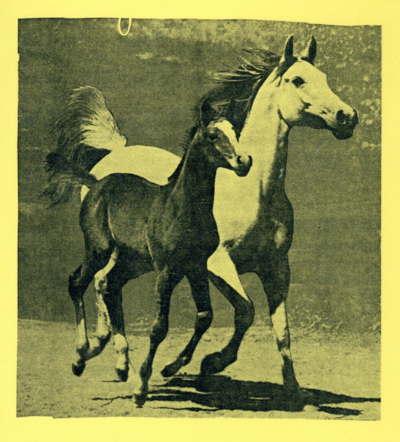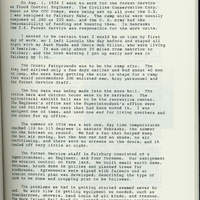093
Item
-
Title
-
093
-
Transcription
-
CCC CAMP DAYS
On Aug. 1, 1934 I went to work for the Forest Service as Flood Control Engineer. The Civilian Conservation Corp, known as the CCC Camps, were being set up all over the U.S. I was assigned to Fairbury Nebr. The camp units were usually composed of 200 or 225 men, and the U. S. Army had the responsibility of feeding and housing them. In Nebraska the U.S. Forest Service was responsible for the work units.
I wanted to be certain that I would be on time my first day of work, so I left Lincoln the day before and stayed all night with my Aunt Maude and Uncle Bob Dillon, who were living in Beatrice. It was only about 25 miles from Beatrice to Fairbury, and the next morning I got up early and was in Fairbury by 7:30.
The County Fairgrounds was to be the camp site. The Army had arrived only a few days earlier and had about 40 men in camp, who were busy getting the site in shape for a camp that would accommodate 200 enlisted men, Army personnel and the Forest Service Staff.
The hog barn was being made into the mess hall. The cattle barn and chicken house were to be barracks. The agricultural exhibit hall was to be the recreation center. The Engineer's office and the Superintendent's office were two red railroad box cars that had been moved in. I was assigned one of them, and used one end for living quarters and the other for my office.
The summer of 1934 was a hot one, day time temperatures reached 110 to 115 degrees in eastern Nebraska, the summer was the hottest on record. We had a fan that helped keep the hot air moving, but the box car had no shade, no air conditioning, and there were no screens on the doors, and it cooled off very little at night.
The Forest Service staff in Fairbury consisted of a Superintendent, an Engineer, and four Foremen. Our assignment was erosion control on farm land. We built small earth dams, terraces, brush dams in gullies and planted trees for windbreaks. Agreements were signed with farmers and an erosion control plan was developed, describing the type of work to be done and cropping plan to be followed.
The problems we had in getting started seemed never to end. We were slow in getting equipment we needed, such as wheelbarrows, shovels, hand tools of all kinds, and fresnos. The Rock Island Rail Road Co. loaned us surveying equipment: a transit, level, rods and stadia boards.
-
Rights
-
To inquire about usage, please contact Archives & Special Collections, University of Nebraska-Lincoln Libraries. These images are for educational use only. Not all images are available for publication.
 Metzger Memories
Metzger Memories
 Metzger Memories
Metzger Memories
